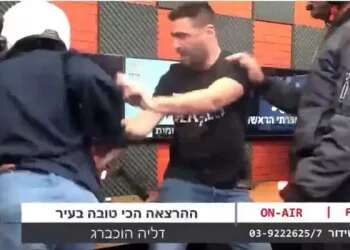Ukrainian President Volodymyr Zelenskyy addressed students at the Hebrew University of Jerusalem in a live speech from Kyiv on Thursday, telling them his country is disappointed by the level of support – both diplomatically and materially – it has received from Israel in its war with Russia.
Follow Israel Hayom on Facebook, Twitter, and Instagram
During his address, Zelenskyy reiterated Ukraine's request for Israel to sanction Russia and for increased military aid.
"I'll be honest with you, I love Israel very much and have visited it several times in the past, but I've avoided giving interviews to Israeli journalists because I don't always know how to answer their questions very well," Zelenskyy said. "I don't know how to answer their questions about Israel's help, or what it could be doing. I'm grateful to the people of Israel. I am grateful for the sincere and emotional support to the people of Ukraine... but we would like to also get support from your government. For example, Luxembourg, with a small population, has provided us with aid at the level of half of its military expenditure. The Baltic states, too, have given us almost everything they could since the start of the war. What about Israel? We understand it's a complicated issue for you, but we need your help to defend ourselves."
The Ukrainian president continued: "When sanctions are imposed against Russia, it's not an economic or business matter. It's to prevent Russian aggression and destruction. This is about values. Anyone who seeks to destroy another country needs to be held accountable. Unfortunately, we have not yet seen Israel join the other countries that are boycotting Russia. I can't say we've received the help we want from Israel."
As a reminder, a senior Ukrainian official accused Israeli ministers of corruption on Thursday, which they alleged was influencing Jerusalem's policies on the war with Russia.
In a conversation with Israel Hayom, the Ukrainian official said: "Unlike the Israeli government, Western governments understood they must support Ukraine. We were surprised and saddened by the Israeli government. Some of its ministers do business with Russia, and we understood that this is a corrupt government, like the Eastern European governments were in the past."
Zelenskyy went on to mention former prime minister Golda Meir in his address, noting that her childhood home in Kyiv was "five minutes" from his presidential office.
"Please remember how much we are linked, how close our ties are, what the level of understanding between us should be," he said. "Why we have this miscommunication, misunderstanding with representatives of the government, I don't know."
Israel has thus far walked a cautious diplomatic line on the Ukraine conflict in part to preserve Russian cooperation in Syria, where Israel regularly conducts air strikes with tacit acceptance from Moscow, which has forces in the country.
"When the war will end, and I believe it will, we will have to look into each other's eyes for many years to come, especially your generation, because students are the future," he said. "Please remember how much we are linked, how close our ties are."
Asked by several Hebrew University students what can be done to keep news of the war in the headlines, Zelenskyy said: "Ukraine's warriors and civilians need medication, drinking water, fuel. People forget that there is a war going on in Ukraine. No matter where you are, where you study, you can help those that are fighting."
Subscribe to Israel Hayom's daily newsletter and never miss our top stories!
In recent months the Hebrew University has taken in a number of Ukrainian researchers and students who escaped the war. Some were in the audience along with Yevgen Korniychuk, the Ukrainian ambassador to Israel.
Zelenskyy also noted the difference between the calm Hebrew University auditorium where students and faculty assembled for his address and the current state of Ukraine's universities.
"Two-thousand academic institutions in Ukraine have been destroyed," he said. "Can you imagine it, sitting in your lovely auditorium at Hebrew University?"
He added: "Week after week… the Russians are trying to hide the fact that they've been burying dead Ukrainian civilians in unmarked graves. They're killing and raping and torturing innocent civilians along the way… By our estimates, more than 12 million Ukrainians have been displaced. We haven't seen these numbers since World War II. How can you not help the victims of such aggression?"




